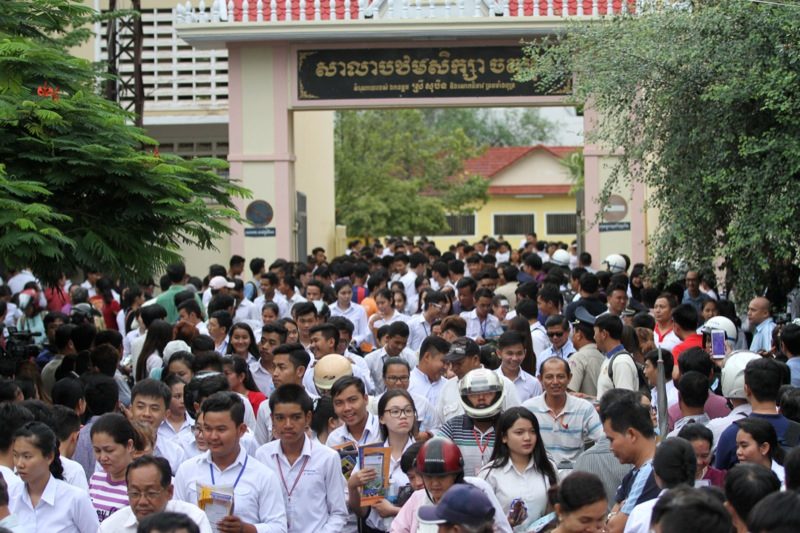“It’s very strict,” said Say Thalina, 18, who had just sat for the exam that will decide whether she can go to university. “I could not even move my neck or the proctor would come up and yell at me.”
The stringent measures were not just confined to her school.

Since 2014 reforms to a national high school exam that was once plagued with cheating and bribery, the two-day exam is closely monitored. All 99,763 students that sat for the exam, which concluded on Tuesday, were watched by proctors, who in turn were watched by Anti-Corruption Unit (ACU) observers.
Attempts at cheating remained minimal this year. According to the Education Ministry, one student was caught using an answer sheet and six students had their phones confiscated—compared to 20 people caught cheating or impersonating an exam-taker in the first year of reforms.
The two-tier monitoring “is probably needed, at least for now,” said Luise Ahrens, manager of the Maryknoll education program at the Royal University of Phnom Penh. “Exam cheating was not only students but school directors/teachers/proctors who benefited.”
Before the reforms, cheating was rife. Students would pay proctors to turn a blind eye as they used cheat-sheets for which their parents paid and passed to them through classroom windows.
When the ACU was brought in alongside threats—so far empty—of legal action, the pass rate plummeted from a peak of 80 percent. It climbed back to 62 percent last year.
Teachers, who serve as proctors, “are not happy with the [ACU] presence as exam time was always a big source of income for them,” Ms. Ahrens said. With teachers “still not getting a living wage…some check on the system is important.”
Entering the grounds of Phnom Penh’s Preah Sisowath High School for the exam over the past two days, Ms. Thalina and her fellow pupils had to remove their shoes, which were checked by ACU inspectors in search of cheat-sheets.
During the entirety of the two-day exam, two proctors walked around the room, keeping an eye on the students. Outside the classroom, two more sets of eyes peered in.
“The ACU observers would stand by each window and watch everyone, every single second,” she said, referring to the 4,687 Anti-Corruption Unit volunteers posted outside classrooms nationwide. “It’s so much pressure.”
Ngov Chihor, 19, a first-year student at the Royal University of Phnom Penh, volunteered as an ACU observer in Battambang province. He witnessed firsthand the uneasy relationship between proctors and ACU observers.
“They are insecure, the proctors,” he said. “When they want to do something they need to ask for permission, so it is hard for them to manage, for example, when the candidate needs to go to the toilet.”
Students also seemed intimidated, he said.
But some students welcomed the scrupulous watch.
“It’s good because it prevents the students from talking to each other. But that still happened, and so the ACU observers went to the proctors and told them to be more strict,” said Pech Sreyroth, 18.
Next year, the unit has been invited once again to partner with the ministry on the exam, according to ACU vice chairman Kheang Seng. Education Ministry officials could not be reached for comment.
Ouk Chhayavy, president of the Cambodian Independent Teachers’ Association, said the ACU’s involvement to cut out bribery was overlooking the root of the problem: low teacher pay and standards.
“If your house has a weakness, please address the issue with your own family. Don’t involved the neighbors,” she said. “They can’t help much.”
(Additional reporting by Thim Rachna)




